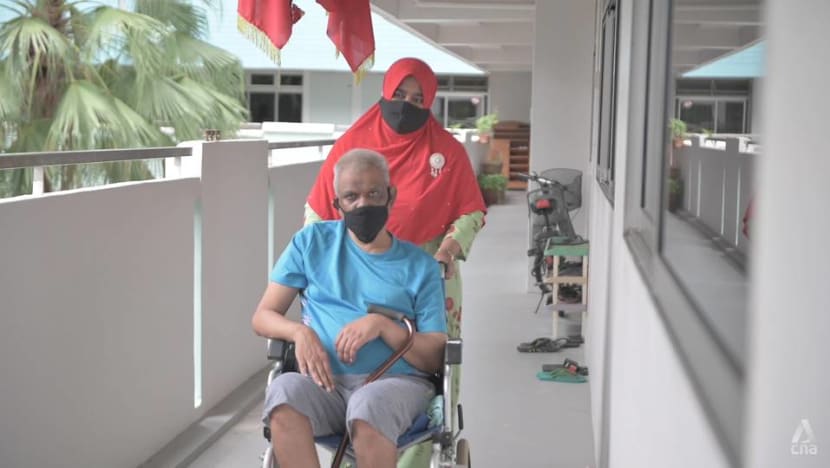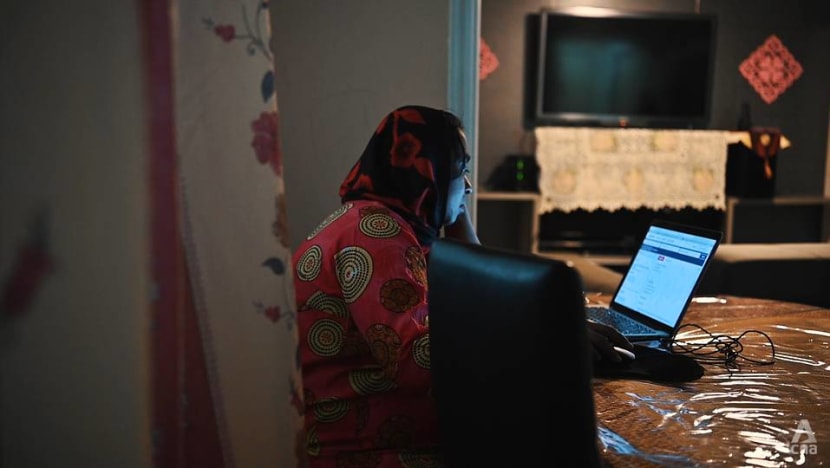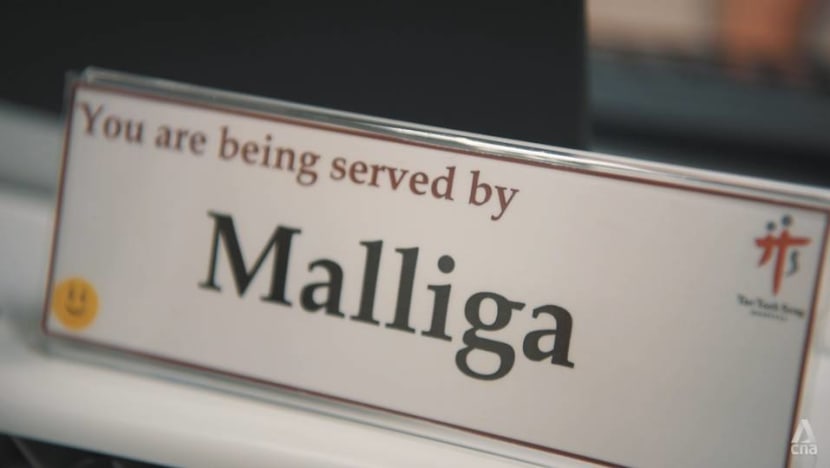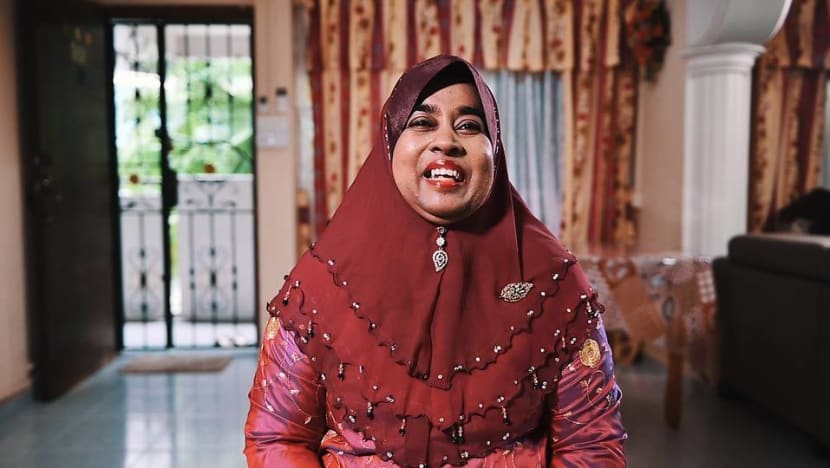Retrenched from her Changi Airport job, she’s making a career switch at 50 – to healthcare
With family bills to pay, and 14 years since she’d last had to look for a job, Malliga wasn’t sure how she’d survive in a changed job market. At her age, could she learn new things? Fortunately, she had help.

Malliga's career at Changi Airport abruptly ended when the COVID-19 pandemic badly affected air travel.
SINGAPORE: For 14 years, Malliga Syed Umar Ali considered the world’s best airport her “second home”.
As a Changi Airport experience manager, she was deeply passionate about her work, going to lengths to help, for example, a passenger who’d missed a flight get to her father’s funeral on time.
“We had to be able to change all complaints to a compliment,” said Malliga.
But in March 2020, the 50-year-old’s dream career came to an abrupt halt, when the airport announced plans for manpower cuts due to the COVID-19 pandemic which had devastated air traffic.
Like the rest of her colleagues, Malliga – who was employed by Kelly Services for the outsourced role – was told to prepare for the strong likelihood that they would be let go. On April 22, she received the official termination letter.
“We cried and hugged each other, because we’re more like a family there,” she said of her airport colleagues.
A TIGHT SPOT
That night, Malliga was expected home earlier for her granddaughter’s birthday celebration, but she arrived “quite late, with a heavy heart”, only telling her family the news after the celebrations.
“We were very shocked,” said her elder daughter, Sathiga Begum, 30.
When her mum had first told them in March about the manpower cuts, Sathiga recalled, “we told her, ‘You definitely won’t be retrenched, mummy, you’re so experienced’.”
It was a financial blow to Malliga.

She was paying for her mother’s and her husband’s medical bills, including for the latter’s post-stroke physiotherapy sessions. Both also needed regular diabetes and hypertension check-ups as well as medication. The total medical bills, after MediSave deductions, came up to roughly S$300 a month.
Malliga also was paying S$500 in cash for monthly instalments on her flat’s mortgage, and still supporting her youngest daughter who was in polytechnic.
Her older daughter and son were able to chip in to help financially. And the COVID-19 Support Grant provided Malliga with S$800 a month for three months, which helped with grocery expenses and the bills.
But while this, as well as her retrenchment package and five months’ worth of personal savings, gave her a cushion, Malliga knew the money wouldn’t last long. She felt the urgency to find a new job.
The catch: The last time she’d been on a job hunt was over 14 years ago, when it meant physically walking into job agencies.
Now, in the midst of a pandemic, and with the job search process having largely moved online, she wasn’t sure how or where to start.
Nor did she know what new line or industry she could move into, with COVID-19 having impacted the jobs landscape so greatly. “After 14 years in one company, I had a big question mark on my mind,” she said.
“How am I going to survive in this new generation, because I’m already 50?”

STRUGGLING IN THE SEARCH
But Malliga was not one to let her insecurities paralyse her.
She began by taking stock of the skills she’d honed: Customer service, the ability to work in a team, and people management. She also had some prior experience working in the security industry.
With her children introducing her to job portals like JobStreet and JobsDB, and teaching her how to navigate them, Malliga applied to “more than 50 companies”, sometimes staying up as late as 1am to work on her applications.
“It’s a bit tedious, but the job won’t come to you just by staying at home and waiting for other people to help you,” she said.
To better her chances, she used her SkillsFuture credits for a security course to upgrade herself.
She also got in touch with Workforce Singapore’s Careers Connect for help with her resume. Not having written one for more than a decade, she’d only listed her two most recent jobs.
She was advised to reframe her resume by specifying her interests, desired job scope, and courses she’d attended, such as a civil defence course as part of her airport job.
Her children taught her how to use Skype and Zoom for online job interviews. “We also assisted her in customising different resumes for customer service, healthcare or administrative jobs,” said Sathiga.
For a strong woman used to taking care of others – an “iron lady”. Sathiga called her – it was difficult feeling helpless and having to rely on her children for a change. At times, Malliga admitted, she would “just break down”.
WATCH: How to start over at 50 (6:38)
A NEW START, WITH NEW CHALLENGES
In the midst of her job search, a message reignited her confidence.
Her former supervisor sent her a link to a job on Tan Tock Seng Hospital’s (TTSH) career portal, knowing she had an interest in the sector.
“I love caring for people, like the elderly living alone at home,” said Malliga. “I’ve been interested in healthcare from young, but I couldn’t get a job (in this field) then.”
This time, things went differently. TTSH interviewed her, and in mid-May – even before she’d served her last day of notice with Changi Airport – she was offered the role of senior patient service associate.
On June 1, she began her new job. It involves welcoming patients and helping them with registration, collecting payment, and assisting doctors during consultations.

She was assigned a buddy, and spent the first week learning more about the organisation through the ULeap app by NTUC’s Employment and Employability Institute.
She also had to get to grips with the medical terminology and basic procedures that she was expected to assist with. She admitted feeling “very blur” at first.
“I didn’t know what the ENT department stood for,” she said, referring to the Ear, Nose, Throat unit. Nor did she know “the ranking of the doctors, or what department I should refer patients to”. She quickly picked all this up as the days went by.
“They also taught me how to take blood pressure reading; how I should approach patients, which hand I should take.”
She noted down terms and procedures in a book, then went home and memorised them. She also got her buddy to walk her through any steps she was unclear about.
WHERE OLD SKILLS COME IN HANDY
Her old customer service experience turned out to be a big asset. For instance, explaining to patients why they could have a long wait at the clinic was akin to explaining to passengers the reason for a flight delay.
This skillset makes her “very competent” at handling patients, said Johnsten Wee, her supervisor and clinic manager of The Cardiac Centre at TTSH.
“She has an edge that we don’t generally see in fresh graduates. When she speaks to patients, it’s very clear and concise. She also doesn’t hesitate to approach difficult patients”. Plus, he added, she is “able to motivate and influence her teammates”.

Malliga believes that the midst of a pandemic is the best time to be of service in healthcare, “People are afraid … Some of the elderly might not even understand what COVID-19 is,” she said. “I can reassure them when they come to the clinic.”
As a newbie, her salary is about half of what she used to earn, and that has meant having to tighten her spending. But she’s positive about where this new road could take her.
“(Within) the next five years, hopefully I can be a supervisor,” she said, adding that she wanted to go for the relevant courses.
Having overcome her own insecurities after retrenchment, she now encourages other mature workers to embrace change. “You have to update your skills, because anything can happen at any time.
“There are many things (the Government) is giving us, like SkillsFuture credits. Make use of that, go for a course,” she said. Keep “an open mind” to jobs that might come your way, and “don’t always say ‘I cannot’.”
Her attitude has inspired her daughter. “Usually at this age when somebody gets retrenched, they easily lose hope… My mum is always willing to take on challenges and learn new things,” said Sathiga.
This story by CNA Insider was done in collaboration with Gov.sg. For more jobs and training opportunities, visit https://go.gov.sg/jobsgohere-cnai



















